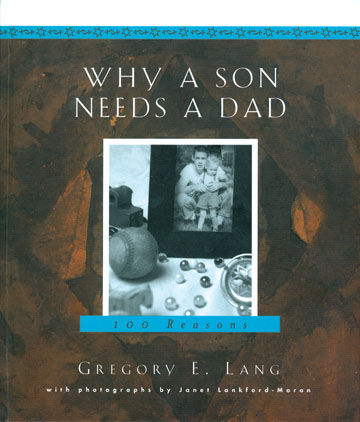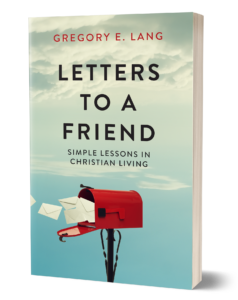I am the first-born child of a household that included five children before my dad was thirty years old. Ours was the house that never seemed to sleep, with constant activity swirling around it and within it, and one that seemed nearly to bust at the edges as the children who called it home continued to grow. My dad worked hard to provide for his family, but also made time to be with his children, both together and one-on-one. He made sure the treehouse we built ourselves was sturdy and safe, that my soapbox racer would indeed cross the finish line, and that once big enough to see over the steering wheel, each child, sitting in his lap, got a chance to drive through the neighborhood in their choice of the station wagon or the old pickup truck.
I have many heartwarming memories from my youth: my dad showing me how to hit a curve ball in the front yard; working with Dad on a Boy Scout project to earn a coveted merit badge; handing him his tools as he tinkered with the car or improved the house on a Sunday afternoon. My dad loved to fish. I remember being awakened by him before sunrise on a Saturday morning, and whispering to not awaken my younger siblings, we slipped outside together to go fishing. Standing at the water’s edge we sometimes talked. Other times we were both content just to listen to the morning sounds. In these early years of my life, my dad was my hero.
As I became a teenager our relationship began to change. Like most young people, I considered myself misunderstood and overtly controlled. I wanted to wear the “in” clothes and stay out late with my friends, shirking my chores and other responsibilities. My demonstrations of rebellion irritated my dad like a pesky splinter under a fingernail. Both being strong-willed, my dad and I clashed often. My stormy coming-of-age years were difficult for both of us. At times our disputes were stormy enough that I questioned our love for one another, and I wondered what happened to the man who had shown me how to fish. When I left home I promised myself I would not be like him when I became a man, and most certainly not when I became a father.
By the time I entered graduate school my dad and I had come to a peaceful co-existence. We were different, but we could get along. We would not talk much, but we would not argue either. The emotion between us was warm, but not embracing. I could thank him for the money he would slip into my pocket when he thought I wasn’t looking and for welcoming me as I came home now and then for one of Mom’s soothing Sunday meals. He could tell me he was proud of what I had accomplished. Our relationship was not what it had been, but it was such that I could love him again. “This will be okay,” I thought to myself. I did not imagine then that years later we would find ourselves sharing a deep bond, that I would feel intensely for him, and that I would be giving my dad credit for helping to shape me into the man I would become.
Today, with more years and a few hundred thousand miles under my feet, I have come to see my father very differently. Now being a father having my own conflict with an emerging teenager and experiencing for myself the stresses and challenges I must have presented in my youth, I smile when I realize my daughter and I are playing out the same debates and negotiations my father and I once did. Now, wiser, I know it was not that I was misunderstood or controlled, but that I lacked the life experience to know what risks I was taking, the judgment to get myself out of trouble before a permanent scar might be made, and the understanding that it was possible something bad could happen to me. Today I know my dad was protecting me from what I could not see, and simply trying to save himself from the gut wrenching fear of allowing his child to let go of his hand.
A dad has the responsibility of providing for his family. Sometimes the difficulties of that task go unrecognized and without gratitude. Now having that responsibility for myself -and for only one child, I might add – I look back in amazement at what my dad did. He sometimes worked two jobs to support his family; he pushed himself beyond his education to acquire the skills necessary for a better career; and he never bought things for himself before he did for his children. We ate well, dressed warmly, received gifts, and went on vacations. Even today he continues to extend help to his adult children when he sees it might be needed. I have called him in the middle of the night and he has come to me.
On my mantle, next to a high school portrait of my mom and amid many photographs of my daughter, sits a picture of my dad and me in the front yard of my parents’ first house. He is squatting down, his arms wrapped around me as I stand between his knees. Sometimes as I reflect on what is important to me, I stand before this mantle and look at those photographs, realizing how blessed I am to have these loving parents and this wonderful child. As I think of the difficult years of my youth, I think that perhaps I owe my parents, especially my dad, an apology, but know that they would wave me off and accuse me of being silly. I think of things I would like to do for them, and I look forward to each time I hurry my daughter into the car and make a trip to the home I left so many years ago. I am eager to get there, to kiss Mom, and to sit on the front porch and talk with my dad.
Now having come full circle as a son who once worshipped, then disfavored, and now deeply admires his dad, and being a father trying my best to parent but finding myself always second guessing my abilities, I wonder if my teenage daughter will ever look at me with dancing eyes again. I think the role of being a dad is the greatest challenge and the highest reward a man can have. Reflecting on my dad and me, I know my child and I will have a wonderful, loving and long-lasting relationship because my dad and I have one. I know that in the end I will be satisfied with my performance as a dad because my dad showed me how to do it. And I can believe that I have been a good son because my dad tells me so. I love you, Dad, I do. And I am proud to be your son.


